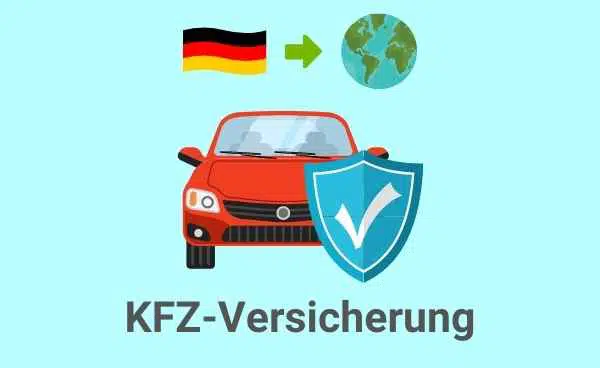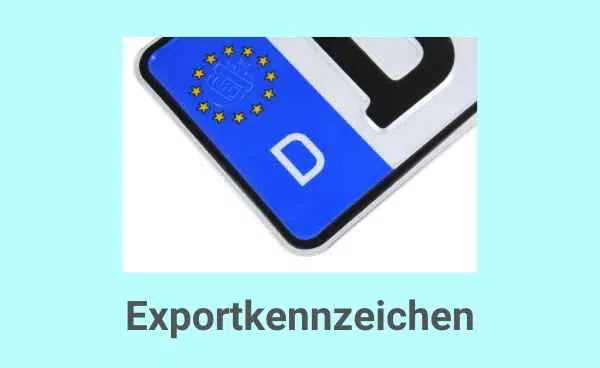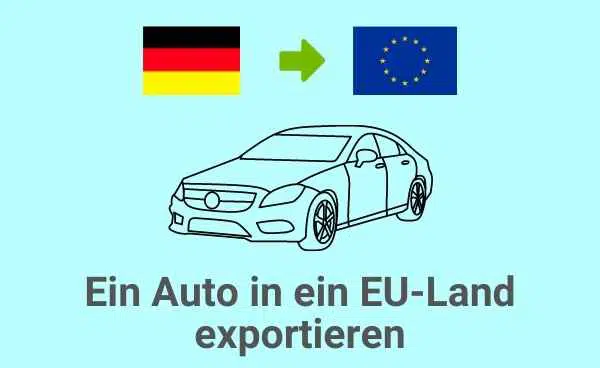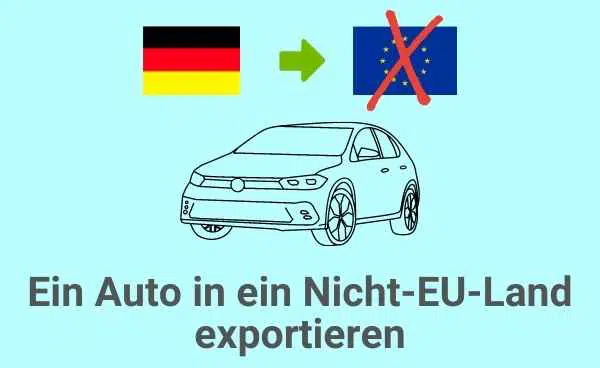German cars generally have a good reputation. You can sell them abroad quite well. Interested in buying a car in Germany for export? You will have to follow some rules. And also finding a good car might be difficult.
In this article I have compiled the most important information that I have gathered from my own experience and from friends and colleagues.
Topics in this article
Finding and purchasing the car >>
Requirements for the buyer >>
Needed documents >>
Car insurance >>
Export car plates >>
Customs procedures >>
Taxes and costs >>
Key takeaways
1. You don’t have to be resident in Germany to buy a car in this country.
2. Passport can be used as identification document when buying a car in Germany.
3. There’s a whole list of documents you need when buying for export. See below.
4. Make sure you take out a car insurance, if you drive the care after buying it. Link to car insurance calculator in the article.
5. Export number plates are another essential requirement.
6. Exporting a car to the EU is different than exporting it outside EU.
7. Expect costs for registration, car plates, car insurance, etc. – See below.
Finding and purchasing the car
For finding and purchasing a car in Germany, you can follow my guide:
How to find a car in Germany on the internet
Whether you are buying a car from a car dealer or a private person, there are a couple of things to take care of. Which I will tell you more about in the next few chapters.
Generally speaking, it does make a difference whether you want to export the car within the EU or to another part of the world.
Requirements for the buyer when acquiring a car in germany for export
To buy a car in Germany, you do not necessarily have to be a German resident.
According to the website Your Europe, you are eligible to buy a car in any European country of your choice.
Please remember that you have to take care of the “Zulassung” or registration in Germany right after purchasing a vehicle in germany for international shipping.
So either
- you have to know someone who has an official “Meldebescheinigung” (registration certificate) for Germany. And this person is willing to register the car in their name in Germany.
- or you have to be registered in Germany yourself
Needed documents for buying a car in Germany for export
You don’t need any documents when considering buying a car as a private person. The only thing you need is a valid passport: “Pass” or “Reisepass” in Germany. The contract will, in most cases, include a specific paragraph where you ensure that you change the car insurance to your name.
The same goes for buying a car from a car dealership. As long as you are not financing a car but buying a car in cash. If there is no bank as a middleman involved in the buying process, you are good with your valid EU passport.
Important: For the moment (2023), there are no limits when paying with cash in Germany. According to capital.de anyone who wants to pay in cash amounts of over 10,000 Euros has to show their identification card or passport. However, this is something that might change in the next months. So my recommendation is to check this first before coming to Germany to buy the car.
You need a few documents after purchasing a car in Germany for export. Please ensure that the seller has all of them at hand.
List of documents
- Sample sales contract with notice of sale for the registration office and insurance company
- Your identity card and the seller’s identity card for data matching, and a copy of the seller’s identity card for security purposes
- Power of attorney for sale, if seller and vehicle owner are not identical
- Registration certificate part I (vehicle registration document formerly called “Fahrzeugschein”) and part II (vehicle title formerly called “Fahrzeugbrief”)
- Certificate of the last leading inspection (HU) and exhaust emission test (AU)
- Keys or code cards for the vehicle
- Operating instructions or “Bedienungsanleitung” in German
- Checkbook (= service booklet = “Serviceheft” or “Scheckheft”), if available
- Maintenance and repair invoices, if available
- Pictures and expert reports in case of accident damage, if available
- General type approval (ABE) for accessories and add-on parts, if available
- Construction permits and parts certificates for accessories and add-on parts, if available
Car insurance when purchasing a vehicle for export
As stated above, you must make sure that you can legally drive the car in Germany. Even if it’s just going from where you bought it to an export facility, you need to take out insurance.
If you plan to export the car, you need a special “Haftpflichtversicherung” (liability insurance).
Take a look at my article about how to find the best “KFZ-Haftpflichtversicherung” in Germany:
Cheapest car insurance Germany
There is no possibility of a partial or comprehensive cover for the customs plate insurance. This insurance therefore does not cover damage to your vehicle.
Car insurance for export car plates
Or you go to the office of your local “Schildermacher” or signmaker that will also press your special export car plates for you.
This specific insurance only covers damages that you might cause with your car for the accident opponent. Not any damages that might happen to your car.
Please bear in mind to take a specific look at the offered coverage amount that comes with the insurance.
Depending on which country you are bringing your car to, coverage may be significantly lower than standard liability insurance.
If you are bringing your car to a country where your car liability insurance is not valid, you will have to take out new liability insurance at the border.
Even if you drive your car through a country where your liability insurance coverage is not valid, you must follow the same process.
Export car plates
Export car plates are an additional essential requirement when buying a car for export. Germans call them: “Exportkennzeichen”, “Ausfuhrkennzeichen” or “Zollzeichen”.
To get an “Ausfuhrkennzeichen” in Germany, you need the following documents:
- Passport or identity card
- Confirmation of special liability insurance (In most cases, you can obtain this from the “sign maker” on-site at the vehicle registration office. You can take out such an insurance for maximum 12 months).
- Registration confirmation part I and II (vehicle registration certificate and letter)
- Proof of a valid general inspection (according to §29 StVZO)
- For deregistered vehicles: decommissioning (immobilization, deregistration)
- If applicable: old license plates
When applying for export licence plates, the last registration certificate Part I, the “Fahrzeugbrief”, is either withdrawn or cancelled. The registration certificate part II, “Fahrzeugschein,” will be updated accordingly.
As a replacement for registration certificate part I, you can ask for an international registration certificate. You will only need this to export your car to a non-EU country.
Customs procedures when procuring a motor vehicle in Germany for exportation
So far, I have had a good experience with the customs procedures, even if they require you to take some steps. Those differ slightly whether you are about to export a car to another EU country or outside the EU.
Exporting a car to an EU country
To export a car to another EU country, you must have an export car plate.
As the seller of a vehicle sold abroad in the EU, you must declare it to customs in writing if the sales price is over 1,000 euros. Below that, a verbal announcement by the seller is sufficient.
No VAT is due if you sell a used car in another EU country.
In the case of a new car, the situation is different. Here, the buyer must pay the VAT in the country of his primary residence.
By the way, a new car is any vehicle with less than 6,000 kilometers and whose first registration was no longer than six months ago.
Suppose you export the vehicle on its axle (operated with its engine power, not on an active means of transport or a trailer behind a motor vehicle). In this case, you submit the export declaration directly to the German customs office of exit.
You can find more information about the “Zollanmeldung” (customs declaration) on the official website of German customs.
Exporting a car to a non-EU country
Exporting a car to a non-EU country is more difficult as you need to declare customs at the German customs clearance.
You can find more information about it here.
Car sales outside the EU The Foreign Trade and Payments Act also regulates car sales to non-EU countries, which means that trade is free.
Thus, in the case of a private sale, no taxes are due, provided that the export can be proven with appropriate documentation. Nevertheless, an export license must be applied for the vehicle in a transaction outside the EU.
The EORI number
For export, an EORI number (Economic Operators Registration and Identification Number) must be applied for. Thus, the information about the contracting parties and the export goods is secured.
For the registration, besides a copy of the vehicle registration certificate, you need:
- a copy of the export invoice (without VAT)
- the indication of the type of transport
- It is also necessary to have information about the border customs point
Once the declaration has been successfully verified, the seller receives an MRN (Movement-Reference-Number). You can use this to prove the export declaration during the transfer at the customs office.
The documentation is then stamped upon export and again upon leaving the EU. This stamped export declaration should be kept carefully. It serves as proof for the tax office.
My tip would be to find a dealer who will handle the affairs of the car is to be sold outside the EU, as the effort for this is relatively high.
Taxes and costs when purchasing a car for export
If you would like to get to know more about the costs of exporting a car from Germany, please take a look at the table I put together below:
| Costs for registration | Between 25 – 50 euros |
| Costs for the export car plates | Between 20 – 40 euros |
| Costs for liability insurance in Germany | Depends on various factors like the type of car, etc. |
| International registration certificate | 10 euros |
| International drivers license | 10 euros |
Conclusion
I hope this article about acquiring an automobile in Germany for export was helpful for you. As you can see, selling cars within the EU is not much of a difficulty, but selling it to a non-EU country requires much more effort from your end.
Please remember that if you have to pay any taxes like KFZ-Steuer in Germany, it will require you to have a German bank account.
If you would like to learn more about opening a German bank account, you can find detailed information here in my detailed article: How to open a bank account in Germany.
USEFUL INFORMATION AROUND CARS IN GERMANY
> How to buy a car in Germany as a foreigner
> How To Find A Car In Germany On Internet
> 5 Steps for Registering A Car In Germany
> Car Tax In Germany | Car Tax Germany Calculator Explained
> Speeding Fines In Germany | Traffic Fines In Germany






